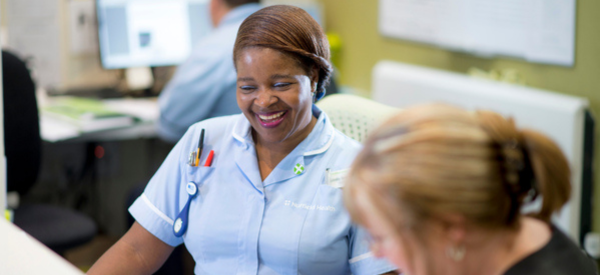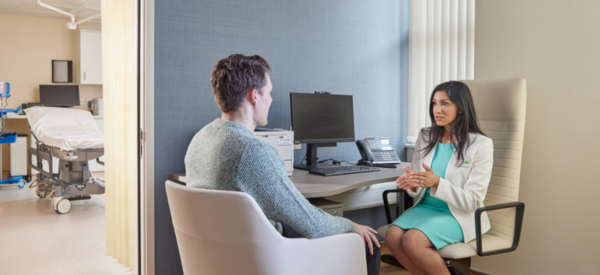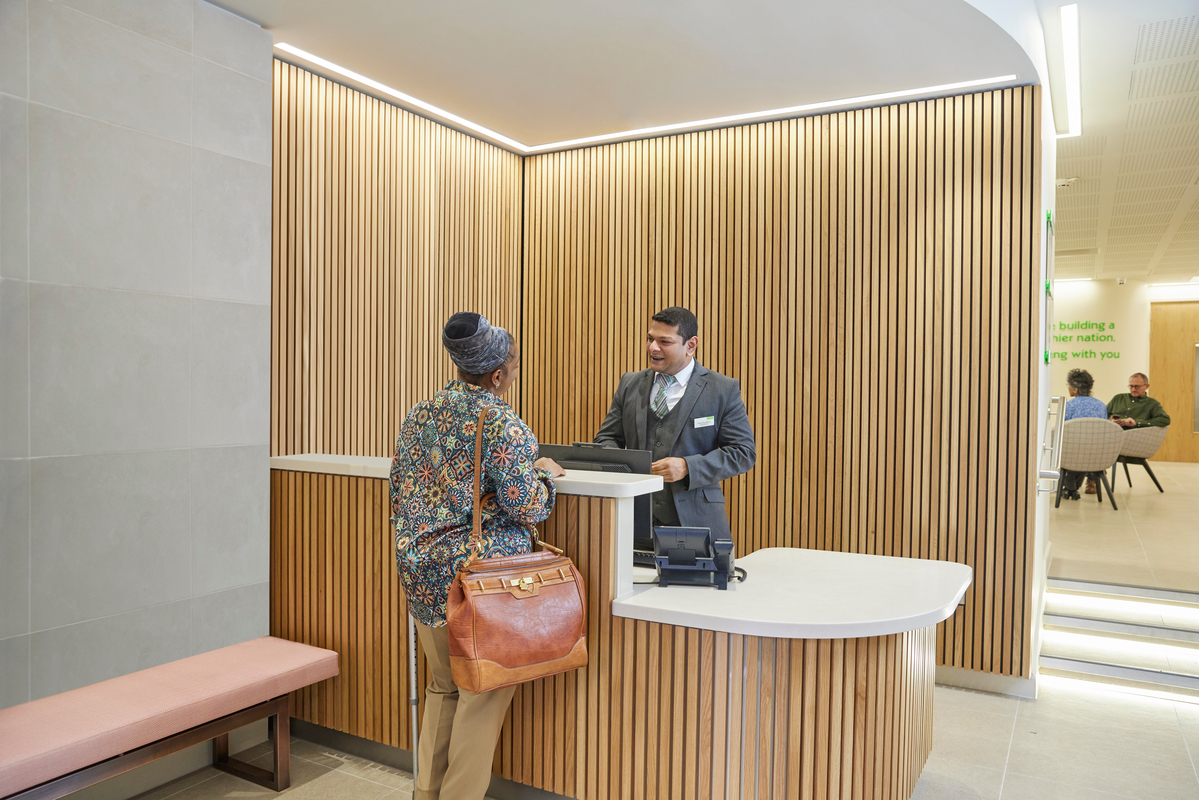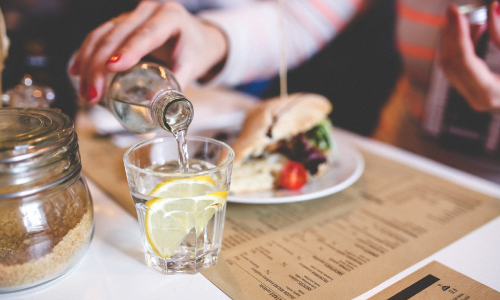Coming into hospital
Complete healthcare with Nuffield Health
Nuffield Health is the largest trading healthcare charity in the UK and holds a unique position in the health sector. Unlike other private healthcare providers, Nuffield Health is a UK independent not for-profit organization. We're solely focused on and motivated by the quality, scope and availability of the care we provide. At Nuffield Health, we focus on the provision of fully integrated care, bringing together our Hospitals, Clinics and Fitness & Wellbeing Gyms into a 'Complete Health and Wellbeing' offering.
By fully integrating prevention and cure, we continue to deliver a cohesive, seamless and highly personalised healthcare service.
Our growing health networks
Founded in 1957 as a healthcare enterprise, Nuffield Health has more than 10,000 health experts providing medical, wellbeing and fitness services to patients, consumers and employers. Our national network includes:
- 37 hospitals
- 112 fitness and wellbeing centres
- 5 medical centres
- 1 diagnostic suite
We are here to provide all patients with an exceptional experience that combines the very best medical treatment whilst providing every patient with a professional, friendly and caring service in a clean and safe environment.
We have over 60 years’ experience of delivering healthcare in our network of hospitals and stand-alone health screening units around the United Kingdom.
As a not-for-profit organisation, we reinvest all monies to ensure that our range of services is second to none. That allows us to serve individuals and local communities with modern medical procedures, delivering high standards of healthcare in an environment that promotes wellbeing. All Nuffield Health Hospitals work to meet the growing demands for affordable acute healthcare throughout the UK, by reinvesting our surplus.
You couldn't be in better hands.
Our people

During your stay with us, we will provide you with all the relevant information you need for total peace of mind.
Our highly qualified and trained staff are on hand to meet your needs, and you can be assured that your treatment will be carried out with professional expertise.
All consultants treating patients at a Nuffield Health Hospital will have been granted 'practising privileges', in line with the Independent Healthcare Providers Network’s “Medical Practitioners Assurance Framework” (MPAF). This framework considers a Consultant’s fitness to practice in their specialty/area.
Each Medical Consultant is appropriately registered with the General Medical Council {GMC) and holds a Licence to Practice.
Your consultant is backed up by a network of healthcare and management professionals and that will help make your stay worry-free and as comfortable as you would want it to be.
Customer satisfaction
Nuffield Health places the patient at the centre of its business and wants to enable the patient to make informed choices about their healthcare needs.
To ensure that we meet this, we conduct patient satisfaction surveys, and we also hold regular customer focus groups to understand where we can make further improvements. Continuous monitoring has shown our Net Promoter Score (i.e. how likely our customers are to recommend us) is +80. We continually strive to improve our services and greatly receive any feedback from our patients.
We look forward to welcoming you to Nuffield Health.
Before your admission
Your pre-operative assessment

Once the decision for you to have surgery has been made, dependent on your procedure you will either be invited to attend the hospital for a pre-operative assessment, be sent a link to complete an online health assessment form, or a nurse will contact you via telephone to ask you questions about your health to ensure you are fit for surgery.
You can read our booklet on preparing for you surgery by downloading it here.Please tell us about any concerns you may have around your arrangements for your discharge particularly if you are a carer for someone else or have any worries about your home environment or support.
If you attend the hospital for a pre-operative assessment, we will perform some routine tests and you will be able to continue with your daily activities afterwards. We do ask that you please bring all your current medicines with you, in their original packet or containers. This includes tablets, capsules, liquid medicines, patches, creams or ointments, inhalers, sprays, insulin, eye/ear/nose drops, injections, pharmacy or supermarket bought medicines, including supplements, vitamins, herbal and homeopathic products. A doctor, nurse or pharmacist will check your medicines to find out what you are taking and how often. They may also ask your permission to contact your GP for further details.
This assessment is crucial, providing us with all the relevant information that enables us to deliver you the safest care. It highlights any issues with your current health that may cause a problem and identifies things such as allergies to latex or specific drugs.
If you have any food allergies or specific dietary requirements, please do let us know so that we can make appropriate arrangements for your stay with us.
Undertaking a pre-operative assessment is vital to make sure you are well enough for your surgery and to confirm that you understand everything that will happen during and after your procedure and the best way to aid your recovery.
If you have been investigated for any medical problems, please bring details of these with you e.g. copies of clinic letters, test results or reports.
Wear layered, loose fitting clothing as you may be required to undress for the tests.
The appointment time can vary depending on the type of surgery you are having and the number of tests that are required. You may also see the physiotherapist as part of this appointment. In general, we would suggest you allow up to two hours for face to face appointments. For telephone assessments, we suggest that you allow up to thirty minutes.
Depending on your general health and proposed surgery, the pre-assessment staff may refer you to be seen by an Anaesthetist. You will be advised of this at the time of your appointment if this is required.
Getting ready for your admission
Following your pre-operative assessment, you will be provided with written information regarding preparation for your surgery, this will include clear instructions about eating and drinking before your surgery and advice on taking your medicines. You will also receive a letter shortly before you are admitted outlining specific pre-operative advice. If you do not receive a letter, or you are unsure about any instructions that you have been given, please call us and we will advise you.
Similarly, should you become ill, however mildly, or your health changes in any way before you are admitted, please contact us to let us know of your condition at the earliest possible opportunity, as it may affect your planned treatment.
If you have had the need to attend any other healthcare facility between the time you met with your consultant to the time you come in to the hospital, please let us know.
It is essential that you inform us of any special requirements or conditions that you may have, such as allergies, so that we do not unwittingly expose you to a risk during your time at the hospital. We take these responsibilities very seriously indeed as your safety is our absolute priority.
If you are a day care patient, and will be having a general anaesthetic or sedation, please arrange to be collected. Your escort will be given a time to ring for information on when to collect you.
It is generally advised that you should not drive until at least 24 hours after your operation, and that a responsible adult is with you during this time. It can take this long for the effects of the anaesthetic to wear off.
Smoking affects the way your wound heals; it is advisable that you stop smoking before your surgery or at least cut down as much as possible.
Brushing your teeth regularly prior to admission will help prevent infections.
If you are diabetic, maintaining good blood sugar control will reduce your risk of infection and promote good wound healing.
Hydration
Having an operation can be both physically and emotionally stressful. Being well hydrated will help get you back to full health as quickly as possible.
Good hydration can assist in enhancing your post operation experience including helping prevent post op nausea and vomiting, headaches, improving wound healing and reducing the risk of post-operative complications- including blood clots.
Hospitals that treat children
You will receive a telephone call from the Children’s Nurse prior to the day of admission during which you will be given detailed information including what to bring and what to expect whilst the child is in our care. Everything is done to make sure children feel assured and happy during their stay.
General Anaesthetics and Pholcodine in Cough Medicines
Some studies have suggested that an ingredient called Pholcodine used in some cough and cold medicines might increase the risk of a very rare event of an allergic reaction (anaphylaxis) in patients who receive a general anaesthetic involving a neuromuscular blocking agent during surgery.
Please inform the medical team before you have surgery if you think you have taken Pholcodine or a product containing Pholcodine, particularly in the last 12 months. If you are currently taking a cough medicine (including tablets and syrups), check the packaging, label or patient information leaflet to see if Pholcodine is a listed ingredient. If it is, you can talk to a pharmacist, who will be able to suggest a different medication for you.
Your day of admission
-
How to prepare
- Follow any fasting instructions you have been given; this is for your safety. If you do not keep to the times you have been asked to stop eating or drinking it may not be possible to continue with your planned procedure.
- If you have been advised to stop taking any of your usual medicines before surgery, please remember to do so.
- Please have a bath or shower before coming to the hospital. Wash your body from head to toe, including your hair (if possible) with a simple soap that doesn’t contain added perfumes.
- Avoid using oils, talcum powder or moisturiser as these products can affect the antiseptics that may be used to clean your skin around your operation site as well as the marker pens which may be used to mark the site for your operation.
- Use a clean towel and put on a clean set of clothes
- Wear loose fitting clothes and flat comfortable shoes.
- Do not wear make-up, nail varnish or jewellery. You can wear a wedding band.
- Remove any piercings
- We do not have facilities to care for your children, so please do not bring them with you.
- The time of your admission does not reflect the time of your procedure, you may be waiting for several hours. You may wish to bring a book/paper/magazine or something else to keep you occupied while you wait.
- Do NOT shave your surgical site as this creates small skin lacerations through which bacteria can enter. If this needs to happen our surgical team will do this for you.
- Please be advised that Nuffield Health requires all patients to provide a payment card swipe at reception on arrival. Please be assured that this system meets all legal and data protection requirements and is completely secure.
-
What to bringDuring your stay we will provide you with all the conveniences you would expect such as fresh linen, hand and bath towels. We advise that you bring the following for your stay, whether admitted for day care, overnight or longer.
- All your current medicines
- Toiletries
- Hairbrush, comb and shampoo
- Toothbrush and toothpaste or denture cleaner
- Shaving equipment
- Sanitary wear
- Nightwear, dressing gown and underwear
- A pair of non-slip slippers or shoes
- Casual, loose clothing to wear during the day
- Any mobility aids that you use
- A favourite toy or comforter, if your child is being admitted
-
Your medicinesIf you are taking any medicines, please bring them all with you in their original labelled packet or container and give them to your nurse, together with any documentation from your GP, such as a repeat prescription form. This includes tablets, capsules, liquid medicines, patches, creams or ointments, inhalers, sprays, insulin, eye/ear/nose drops and injections. Please also bring any medicines that you are taking which you have purchased from a chemist or supermarket, including supplements, vitamins, herbal and homeopathic products.
The benefits to you by using your own medicines in hospital:- It will help the clinician to prescribe the correct medicines for you
- You will receive the correct medicines straight away
- You will not miss any doses and/or will avoid delay in treatment
- It will make going home quicker and easier
If you forget to bring your medicines with you when you come into hospital, don’t worry. Please ask a relative or friend to bring them when they next visit. If this is not possible, we can contact your relative or friend for you on your behalf.
You will be encouraged to self-administer your medicines as soon as you are well enough, and your medicines will be returned to you upon discharge.
There may be changes in your medication requirements following your procedure and, with your consent, we can dispose of any medicines you brought into hospital but no longer require. We will tell you about any changes or additions to your medicines and when you leave the hospital your discharge letter will provide written information about those changes, a copy of which will be sent to your GP. If you have any questions please speak to the nurse, doctor or pharmacist looking after you.
In most cases you will be advised not to take sedative drugs for the 24 hours following your operation, unless prescribed. Of course, every individual has a unique set of circumstances and our staff, and your GP or consultant will give specific advice relevant to your condition.
All medication will be returned to you when you go home, along with any additional medication you have been prescribed. Before your admission, please make sure you have some over the counter painkillers (e.g. paracetamol, Ibuprofen) available at home for any mild pain relief.
If you do have any further queries not covered here, please don't hesitate to contact us. -
Your spiritual needsIf you would like to be visited by a religious or spiritual representative during your stay, please let your nurse know as soon as possible, so that this can be arranged.
Safety
We make every effort to ensure that you are kept safe during your stay with us. However, there are some things you can do to support your own safety:
Hand hygiene
Good hand hygiene is essential to reduce the transmission of infection. We will ask you to use hand gel and regularly wash your hands throughout your stay.
Respiratory hygiene
Use a disposable single-use tissue to cover your nose and mouth when sneezing, coughing, wiping or blowing your nose.
Falls
Anaesthetic, pain medication, change in environment or using mobility aids can all contribute to the risk of falls. Wear well-fitting footwear, the non-slip socks you have been provided with or use the walking aids issued post-operatively.
Blood Clots – Deep Vein Thrombosis
Any patient having surgery is at a varying degree of developing a clot. You can help minimise the risk of developing blood clots by taking any blood thinning tablets or injections prescribed during your stay. You may be asked to wear surgical stockings, your nursing team will tell you how to put them on and take them off, and how long to wear them for. Try to do simple leg and ankle exercises or take short walks if you are allowed and drink fluids as recommended. You may need to continue treatment when you get home.
Pressure Ulcers
Pressure ulcers develop when there is pressure on an area of skin for a prolonged period of time. The risk is increased when you have surgery or you are unwell, or if you have fragile skin or reduced hydration or nutrition. To avoid developing pressure damage, you should change your position regularly when in bed or sitting. Look out for any areas of redness on your skin, if you are sore in any area, please let us know immediately. We are very happy to help you change position.
Sepsis
Sepsis is a rare and serious condition that occurs when you develop an infection that can overwhelm your body’s natural defences. Please let us know if you feel unwell and have any of these symptoms:
- Slurred speech
- Extreme shivering or muscle pain
- Passing small amounts of urine
- Feeling very short of breath skin mottled or discoloured.
Please let us know if you are worried or feel concerned about your care or treatment at any time during your stay. We are here to help.
For more information about patient safety, visit our Patient infection prevention and visitor infection prevention pages.
Preparing to go home
You will have been told how long you are expected to stay in hospital; however, you may be ready to go home before that, or you may need to stay a little longer. This will depend on how you recover following your surgery and will be decided during discussions with the healthcare team.
Details of follow-up appointments will either be given to you during your stay or sent to you via post by your Consultant.
For full advice and information about what to expect when you leave hospital, click below.

For a printable version of this information, please download by clicking here

